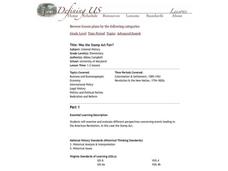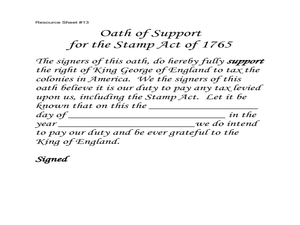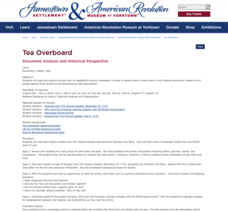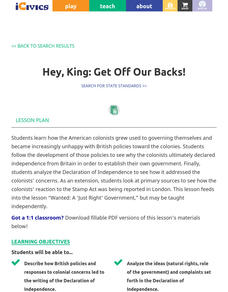Curated OER
Was the Stamp Act Fair?
Elementary and middle schoolers examine and evaluate different perspectives concerning events leading to the American Revolution. In this case, they hone in on the Stamp Act. They research controversial bills, laws, or events of the time...
Center for History Education
Was the Stamp Act Fair?
Pledge your loyalty to the king and the Stamp Act or sign an oath against the tax. After simulating an in-class tax for school supplies, young historians consider the reasons for the Stamp Act and similar colonial policies. The...
Digital History
The Stamp Act and Virtual Representation
"No taxation without representation!" While many have heard this rallying cry of the American colonists prior to the Revolutionary War, rarely is time given to hear the British reasoning behind their implementation of the Stamp Act. This...
Curated OER
Empire to Independence
Here is a wonderful presentation, perfect for setting the stage for the Revolutionary War. Containing great information and images, it acts as a timeline of events starting with the French Indian War and ending with the dawn of the...
Curated OER
The Stamp Act of 1765
Eleventh graders explore the origins of colonial objections to "taxation without representation". In this American History lesson plan, 11th graders create a presentation on specific topics in relation to the Stamp Act.
Curated OER
The Stamp Act
In this teaching American history worksheet, students examine a primary source document regarding the Stamp Act. Students discuss their impressions of the document.
Curated OER
Oath of Support for the Stamp Act of 1765
In this Stamp Act worksheet, students fill in the blanks of the oath of support for the Stamp Act. Student also sign the fictitious document to show their support of the act.
Curated OER
Stamp Act: Support of Oppose
In this American Revolution worksheet, students complete a graphic organizer with information regarding the support and opposition of the Stamp Act.
Curated OER
"No Stamped Paper to Be Had"
Students examine primary documents pertaining to the Stamp Act to explain colonial objections to the expansion of taxes.
Curated OER
Bossy Britain Upsets Colonists
Students examine the causes of dissatisfaction that led to the American Revolution. Then they make a Flap Vocabulary Book and glue on a map of the thirteen colonies and make a title page called "Road to War in it." Students also...
Curated OER
George Grenville’s Speech in the House of Commons,January 14, 1766
In this Stamp Act worksheet, young scholars read and discuss an excerpt of the speech delivered by George Grenville to the House of Commons in defense of the act.
Curated OER
Causes of the American Revolution
Challenge your fifth graders with this lesson. They read about the American Revolution, discuss key terms, and engage in a variety of activities. First, they create a timeline, then they answer an online quiz, and finish by making a...
Los Angeles Unified School District
Why Is the Declaration of Independence Important?
Fair or unfair? To begin a study of the American Revolution, class members review the treatment of the people of the American Colonies by the King of England and decide which were fair and which were unfair. Class members then annotate a...
Curated OER
Rules, Resistance and Repeal: How the Stamp Act Was Repealed
Eighth graders examine the causes of the American Revolution. Participating in activities, they discover how it would have felt to be taxed without representation. They identify an object from a museum and discuss how it might have been...
Jamestown-Yorktown Foundation
Tea Overboard
While less well known than the event in Boston, the Yorktown Tea Party was equally decisive in turning community sentiment against Great Britain. To gain an understanding of why the colonists objected to the Tea Act, young historians...
Center for History Education
The Non-Importation Movement
Boycott for free trade! An eye-opening lesson explores the non-importation movement created by American colonists in response to the Stamp and Sugar Acts. Scholars specifically look at the impact the boycott had on colonial women who had...
Curated OER
The Townshend Acts of 1767
Students examine the events leading up to and after the Townshend Acts in Boston. In this American History lesson, students engage in a class discussion and write an essay about the failure of the British Stamp Act and the Colonial...
Curated OER
The American Revolution
In this American Revolution activity, students read and discuss a 2 page article on The American Revolution, answer 2 statements with multiple choice answers and fill in 6 blanks to complete 6 facts referring to The American Revolution.
Curated OER
Revolt in Boston
Eleventh graders study the American Revolution. For this American History lesson, 11th graders analyze primary sources. Students participate in a simulation on taxes.
Curated OER
The American Revolution
Eleventh graders read and analyze document based questions about the American Revolution. In this American History lesson, 11th graders analyze documents and pictures.
Curated OER
Surrender at Yorktown
Eighth graders examine the start of the American Revolution. In this American History lesson, 8th graders analyze primary sources. Students prepare a narration of events leading up to the revolution.
Curated OER
The Coming of Independence
Provide your learners with an opportunity to show what they know. Have them answer 10 questions on colonial America, 13 Colonies, colonial legislature, and popular sovereignty. There are 5 true/false and 5 multiple choice questions.
iCivics
Hey, King: Get Off Our Backs!
Young historians explore the reason American colonists were unhappy under British rule. Class members complete hands-on activities and participate in a group discussions to understand why colonists drafted the Declaration of Independence.
Carolina K-12
On the Road to Revolution: Creating a Living Timeline
Divided into nine topic groups, from the Proclamation of 1763 to the Battles of Lexington and Concord, your young historians research significant events on the road to the American Revolution, then create a two- to three-minute sketch...

























